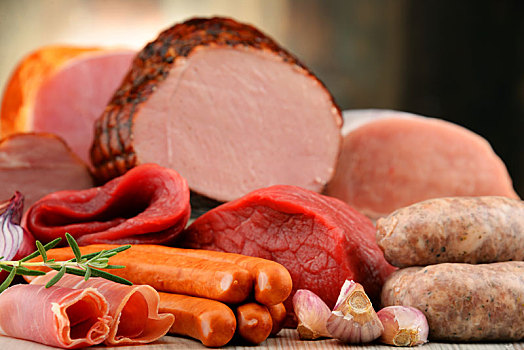Meat Processing Special Phospholipid,Emulsifier,Water Retaining Agent
Time:2024-08-21
The addition of phospholipids in meat products is primarily based on their various properties, which play a crucial role in enhancing the quality, texture, and shelf life of these products. The following outlines the specific applications of phospholipids in meat processing:
1. Emulsification
Phospholipids act as emulsifiers in meat products, forming stable emulsions that allow fat and moisture to bind more effectively, thereby improving the meat’s smoothness and tenderness. This emulsification helps prevent the separation of fat and moisture during processing, keeping the meat juicy and tender.
2. Water Retention
Phospholipids can form a protective film on the surface of meat products, preventing moisture loss and maintaining the water content of the meat. This is crucial for enhancing the tenderness and mouthfeel of the meat, ensuring that consumers experience a juicier product.
3. Texture and Structure Improvement
The addition of phospholipids can improve the texture and structure of meat products, making them firmer and more elastic. This enhances the overall quality of the meat products, meeting the demand for high-quality meat among consumers.
4. Enhanced Processing Efficiency
During meat processing, phospholipids can also act as lubricants, making the meat easier to handle and process. This not only increases processing efficiency but also reduces mechanical damage during processing, helping to maintain the integrity of the meat products.
5. Extended Shelf Life
The antioxidant properties of phospholipids help delay the oxidation and spoilage of meat products, thereby extending their shelf life. This is significant for the preservation and transportation of meat products, reducing losses due to improper storage.
Specific Applications
·In sausages, hams, and other meat products: Phospholipids are commonly used as emulsifiers and water retention agents to improve the fineness, elasticity, and moisture retention of the products.
·In braised and marinated meat products: The addition of phospholipids can enhance the taste and texture, making the products more flavorful and appealing.
Considerations
·Dosage Control: The amount of phospholipids added should be carefully controlled based on the type of meat product, processing techniques, and quality requirements. Excessive addition may affect the natural taste of the meat and disrupt the balance of its nutritional content.
·Quality and Safety: When using phospholipids, it is important to choose reliable brands and manufacturers that comply with national standards to ensure the safety and stability of the products.
The use of phospholipids in meat products offers multiple advantages and benefits. By leveraging these properties effectively, the quality and taste of meat products can be significantly enhanced, meeting consumer demands.


 CN
CN





